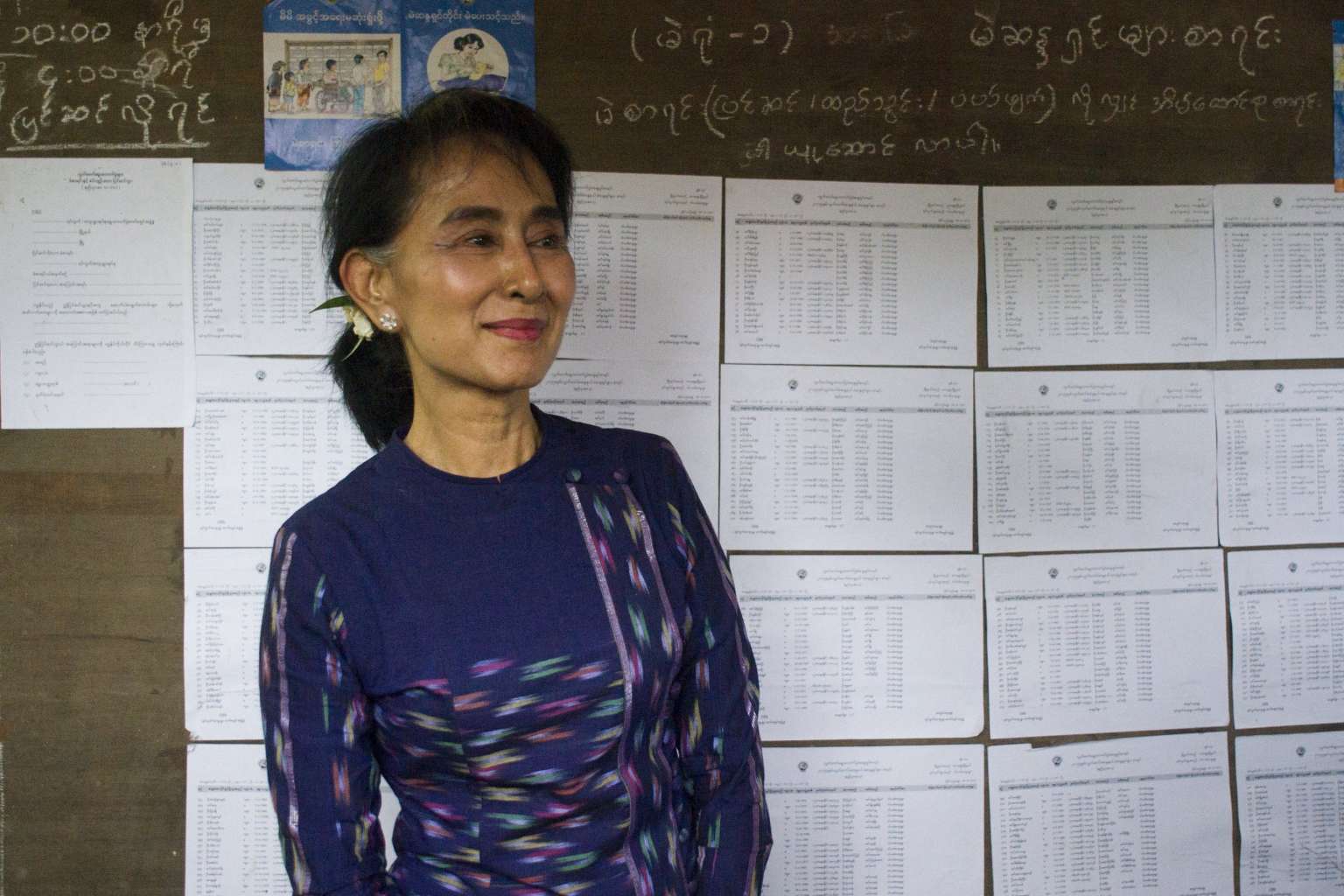Myanmar's army chief says he would welcome female president; Suu Kyi decries voter list chaos
Sign up now: Get insights on Asia's fast-moving developments

Ms Aung San Suu Kyi on Monday urged supporters to check their names on voter lists as her opposition party raised the alarm over "chaos" in Myanmar's electoral rolls just weeks before historic polls.
PHOTO: AFP
Follow topic:
NAYPYIDAW, Myanmar (AFP) - Myanmar's powerful army chief said on Monday (Sept 21) that he would welcome the prospect of a female president, words that will be little comfort to opposition leader Aung San Suu Kyi, who is barred from the post, even as she raised concerns over incorrect voter lists.
Myanmar holds parliamentary polls in November, and even though Ms Suu Kyi's National League for Democracy (NLD) is expected to make significant gains, she will not become president.
Under a military-drafted Constitution, the country cannot be led by anyone with foreign-born offspring. Ms Suu Kyi's children were born in Britain to a British father.
But in a rare interview with local and international media, General Min Aung Hlaing said he had no issue with the formerly junta-run nation being led one day by a woman.
"I welcome them. Whether man or woman to serve duty, I welcome them," the army chief, dressed in a starched uniform, said at the meeting in a military compound in the capital Naypyidaw.
"We arrived here this stage because our mothers nurtured us," he said, adding that he had also appointed women to senior posts within the Tatmadaw (military).
"There are many women officers in our Tatmadaw as well now. We see they are also very capable."
Some 30 million voters are expected to head to the polls on Nov 8 for what observers hope will be the freest election in decades.
Observers say the army is deeply wedded to its perceived role as protector of the Myanmar Constitution, which was drawn up under a former military regime that suppressed all dissent and kept Ms Suu Kyi under lock and key for some 15 years.
The NLD has vowed to change the charter to reduce the army's role and overturn the provision which bans Ms Suu Kyi from becoming president.
The country's next leader will be chosen three months after the election. Three candidates will be put forward and voted on by the two houses of parliament and the military.
Current President Thein Sein, himself a former general and member of the military-backed Union Solidarity and Development Party (USDP), is seen as a likely candidate.
In an interview in July, General Min Aung Hlaing said he had not ruled out becoming president if asked.
The NLD has not said who its preferred candidate will be.
Meanwhile, Ms Suu Kyi on Monday urged supporters to check their names on voter lists as her opposition party raised the alarm over "chaos" in Myanmar's electoral rolls just weeks before historic polls.
The NLD has raised growing concerns about the electoral rolls, which it says are riddled with errors.
Speaking at her first campaign rally in her rural constituency of Kawhmu south of Yangon, the Nobel laureate implored local people to double-check their details on the voter lists.
"If you are not included in the voter list, correct it. You still have time," she told throngs of supporters, many of whom wore their traditional ethnic Karen clothing and had plastered NLD stickers on their cheeks.
With the eyes of the international community on the election, the poll authorities have vowed to ensure they are credible and voters have until October to amend any errors.
But efforts to computerise electoral rolls have proved a major challenge for the authorities, who have had to base their information on flawed and out-of-date official lists.
"The voter lists are in a state of chaos," said the NLD's Mr Tin Oo, at a press conference of senior party figures in Yangon on Monday, decrying an increase in errors since the last time the lists were put on display.
"It's questionable whether the upcoming 2015 (vote) will be free and fair," he added.
The November election is meant to crown four years of remarkable change in the long isolated nation, but there are mounting fears of backsliding on reforms.
The USDP swept flawed polls in 2010, unopposed by the NLD and Ms Suu Kyi, who was still under house arrest.
A quasi-civilian government, which took power the following year, introduced a series of rapid economic and political reforms after decades of isolation and poverty under the military.
But Ms Suu Kyi, who entered Parliament in 2012 as MP for Kawhmu, has warned that the reforms have stalled.
Myanmar languished for years under a brutal isolationist junta which crushed opposition and ruined the economy while enriching a coterie of senior military officers.
In 2011 army rule gave way to a quasi-reformist civilian government - dominated by former generals - which led to the lifting of most Western sanctions and a promise of elections.
The November polls will be the first general election in a quarter of a century to be contested by the NLD.
But the army will continue to wield significant political influence even if the opposition sweeps the polls because 25 per cent of seats in Parliament will still be reserved for the military.

